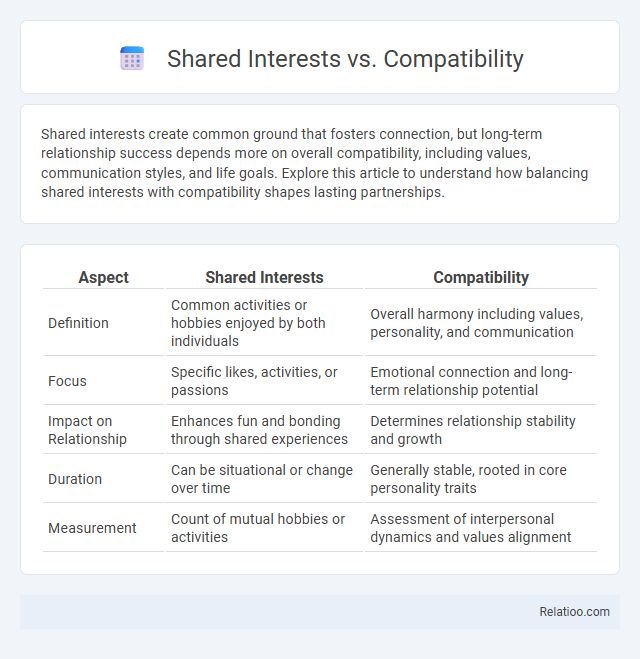Shared interests create common ground that fosters connection, but long-term relationship success depends more on overall compatibility, including values, communication styles, and life goals. Explore this article to understand how balancing shared interests with compatibility shapes lasting partnerships.
Table of Comparison
| Aspect | Shared Interests | Compatibility |
|---|---|---|
| Definition | Common activities or hobbies enjoyed by both individuals | Overall harmony including values, personality, and communication |
| Focus | Specific likes, activities, or passions | Emotional connection and long-term relationship potential |
| Impact on Relationship | Enhances fun and bonding through shared experiences | Determines relationship stability and growth |
| Duration | Can be situational or change over time | Generally stable, rooted in core personality traits |
| Measurement | Count of mutual hobbies or activities | Assessment of interpersonal dynamics and values alignment |
Understanding Shared Interests in Relationships
Understanding shared interests in relationships anchors emotional connection and fosters lasting bonds by aligning activities and values you both enjoy. These commonalities enhance communication and create meaningful experiences that build trust and intimacy. Prioritizing shared interests while respecting individual differences strengthens relationship compatibility and supports ongoing discovery.
Defining Compatibility: Beyond Common Hobbies
Compatibility extends beyond shared interests by encompassing emotional depth, communication styles, and core values alignment. While common hobbies create initial connections, true compatibility requires understanding each other's life goals, conflict resolution methods, and personality traits. This holistic approach fosters sustainable relationships that thrive on mutual respect and personal growth rather than just similar pastimes.
Shared Interests: The Pros and Cons
Shared interests foster immediate connection and facilitate engaging conversations, enhancing social bonding and relationship satisfaction. However, relying solely on shared interests may limit exposure to diverse perspectives and hinder growth, as compatibility also encompasses values, communication styles, and emotional alignment. Balancing shared interests with deeper compatibility factors supports richer, more resilient relationships and meaningful discovery over time.
Compatibility: The Core of Long-Term Connection
Compatibility forms the foundation of enduring relationships by aligning core values, lifestyle preferences, and emotional needs between partners. While shared interests foster initial connections and discovery encourages exploration, compatibility ensures sustainable harmony and mutual growth. Couples with strong compatibility experience deeper understanding, effective communication, and resilience through challenges, reinforcing long-term commitment.
Can Relationships Thrive Without Shared Interests?
Relationships can thrive without shared interests when there is strong compatibility in core values, communication styles, and emotional support. Your ability to embrace discovery and appreciate each partner's unique passions fosters growth and deeper connection beyond common hobbies. Prioritizing mutual respect and open-mindedness often outweighs the need for identical interests in sustaining long-term love.
The Role of Values in Compatibility
Values play a crucial role in compatibility by influencing your core beliefs and guiding long-term decision-making in relationships. Shared interests can enhance everyday enjoyment, but compatibility rooted in aligned values ensures deeper connection and mutual respect. Discovery of these values early on helps identify whether a relationship can sustain challenges and grow authentically.
Assessing Compatibility: Key Factors to Consider
Assessing compatibility involves evaluating core values, lifestyle choices, and communication styles to ensure long-term relationship success. Shared interests foster connection but do not guarantee compatibility without aligned goals and emotional understanding. Discovery through open, honest dialogue enables partners to uncover deeper layers of compatibility beyond surface-level similarities.
Balancing Differences: Navigating Diverse Interests
Balancing differences in relationships requires recognizing that shared interests are not the sole foundation for connection but complement compatibility and discovery. Your ability to navigate diverse interests fosters deeper understanding and growth, allowing both partners to embrace individuality while strengthening their bond. Prioritizing open communication and mutual respect enables a harmonious blend of interests, enhancing relationship resilience and satisfaction.
Building Strong Bonds: Interests vs Compatibility
Building strong bonds hinges on balancing shared interests with deep compatibility, as common hobbies foster connection while aligning core values ensures lasting harmony. Shared interests spark engaging conversations and create enjoyable experiences that unite individuals in the short term. Compatibility goes beyond activities, encompassing emotional understanding, communication styles, and life goals essential for enduring relationships.
Finding Your Relationship’s Unique Balance
Finding your relationship's unique balance involves understanding the roles of shared interests, compatibility, and discovery. Shared interests build a foundation for enjoyable activities and mutual engagement, while compatibility ensures alignment in core values and long-term goals. Continuous discovery fuels growth by revealing new dimensions of each other, creating a dynamic and evolving partnership tailored to your unique connection.

Infographic: Shared Interests vs Compatibility
 relatioo.com
relatioo.com